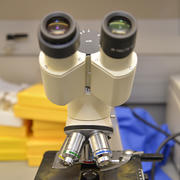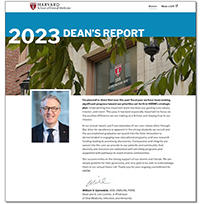
HSDM Dean William Giannobile and Forsyth Institute CEO Wen Shi recently announced the recipients of the first Harvard School of Dental Medicine and Forsyth Institute joint pilot grants. Awards were made on October 1, 2022. Each project has a HSDM principal investigator and a Forsyth principal investigator and is funded with $50,000 per institution, per project, for one year. The following projects were selected for their potential to build on promising studies that will lead to future external funding.
Drs. Yingzi Yang (HSDM) and Xuesong He (Forsyth), received funding for their project, “Bidirectional Interactions Bridging the Gut-Bone Axis.” Their study aims to provide evidence for bidirectional interaction between the gut microbiome and systemic bone homeostasis by investigating if systemic bone loss resulting from a Piezo1/2 mutation could negatively impact the host gut microbiome via immunoregulation, and further aggravate the imbalance of systematic bone metabolism. The completion of the proposed pilot study will set a solid foundation for a future collaborative proposal to achieve a detailed mechanistic understanding of bidirectional interactions bridging the gut-bone axis.
Drs. Shigemi Nagai (HSDM) and Jirun Sun (Forsyth), received funding for their project, “Simultaneous Non-Invasive Diagnosis and Therapeutic Treatment of Dental Caries.” Their project will investigate a new approach for concurrent non-invasive detection and inhibition of enamel and dentin caries in interproximal, occlusal, and axial surfaces. It builds upon previous studies using a commercially available fluorescence imaging agent. The success of their research will provide novel clinically applicable materials and approaches to effectively detect and treat enamel and dentin caries.
Drs. Jennifer Gibbs (HSDM) and Felicitas Bidlack (Forsyth), received funding for their project, “Hypersensitivity and Neurogenic Inflammation in Molar Hypomineralization.” They will explore the condition of molar hypomineralization (MH) where the teeth of MH-affected children have sporadic lesions with reduced mineral and elevated protein content. Because increased enamel porosity allows for continuous stimulation of dental pulp and leads to pain due to dental hypersensitivity, the researchers will use a murine model with MH phenotype, to induce repetitive stimuli and study the innate immune response within the pulp, reactionary dentin formation and neurons/mechanisms responsible for hypersensitivity. They will also test a novel peptide-based remineralization agent to treat the hypersensitivity and harden the enamel with the hope of finding targeted treatment options that are effective for MH and have broader applications to address dental neurogenic inflammation and pain sensitivity.
"We would like to thank all the applicants for their excellent proposals and congratulate the recipients on these notable awards. This is the first of many exciting collaborations between HSDM and Forsyth. We applaud these partnerships between our talented researchers and wish them great success," Giannobile and Shi said.


